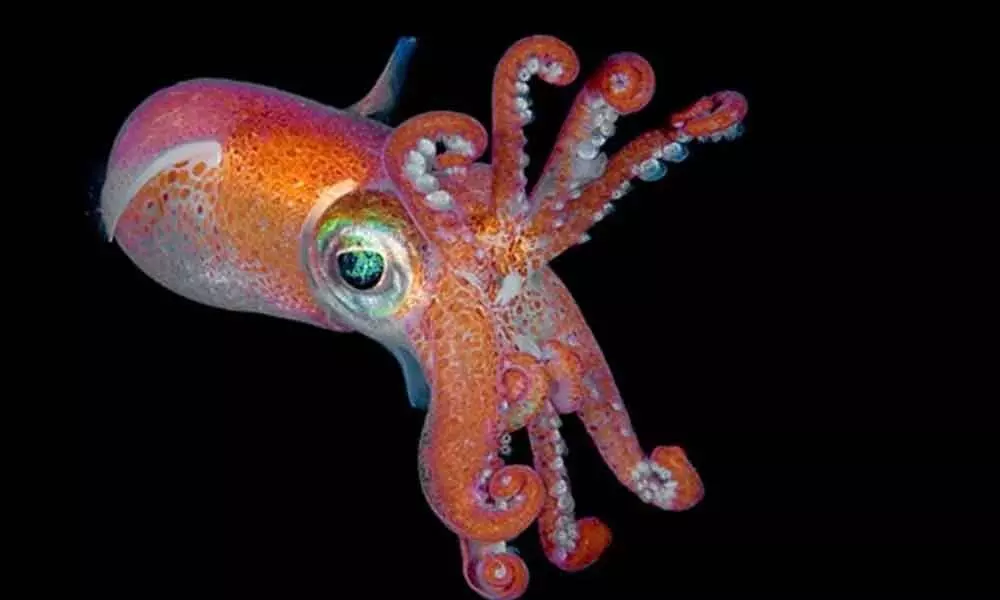The United Kingdom Has Declared Octopuses And Crabs To Be Sentient Entities

A common bobtail squid (Sepietta oweniana). (SeaTops/Getty Images)
- Animal Welfare Minister Lord Zac Goldsmith from the United Kingdom released a statement stating decapods and cephalopods are protected by this essential piece of legislation as research has now proven that they can feel pain.
- The researchers looked at eight different aspects of sentience in these invertebrates, such as learning ability, the presence of pain receptors and their relationship to the brain, anesthetic response, and injury-protective actions.
The United Kingdom has legally acknowledged octopuses and crabs as sentient beings, bringing the country closer to scientific consensus on these intelligent species. Animal Welfare Minister Lord Zac Goldsmith from the United Kingdom released a statement stating decapods and cephalopods are protected by this essential piece of legislation as research has now proven that they can feel pain. They further explained that sentience refers to the ability to experience emotions such as pain, pleasure, hunger, thirst, warmth, joy, comfort, and excitement. The researchers looked at eight different aspects of sentience in these invertebrates, such as learning ability, the presence of pain receptors and their relationship to the brain, anesthetic response, and injury-protective actions.
The addition to the Animal Welfare Sentience Bill, which would safeguard decapods and cephalopods alongside all back-boned animals from frogs to dogs, comes after the London School of Economics and Political Science reviewed over 300 scientific research. Cephalopods such as squid and octopuses and decapods including animals like crabs and lobsters already have animal welfare regulations in other European countries such as Norway, Sweden, and Austria.
Considering how strange some of their characteristics, such as octopus arm-'brains,' appear to us, these incredible species demonstrate such abilities thanks in part to their intricate central nerve systems. Cephalopods have shown that they are quite intelligent. Cuttlefish, for example, can pass cognitive tests meant for human children, whilst octopuses can recognize specific humans, recall how to solve problems they've seen previously, and are famed escape artists. They, too, experience emotional anguish, and when confined to situations that are devoid of stimulation, they become dissatisfied and bored in the same way that we do. They might even have the ability to dream.
Crabs, as well as the octopus, also had shown the potential to understand by connection. They can figure out how to negotiate complicated mazes and recognize and remember that a phoney seagull is not a threat. They also feel pain and exhibit protective and learning behaviors to avoid it, as well as being stressed by excessive loudness. Although some of the species covered by the proposed updates lack these features, the study notes that this is due to a lack of research rather than evidence of absence. As a result, it suggests that protections be extended to all species in these two categories.
According to the study, reasonable and widespread animal welfare concerns. proportional efforts to restrict behaviors that are a cause of reasonable and widespread animal welfare concerns. This includes prohibiting declawing and humanely murdering decapods, which means no more horrific live lobster boilings. They further propose that live crustaceans should only be sold by qualified handlers. Jonathan Birch, a cognitive science philosopher stated that the amendment will also assist to resolve a key inconsistency comprisingoctopuses and other cephalopods that have long been protected in science, but until now, they have not been protected outside of science.
Thereby recognizing octopus and crabs as sentient beings is a positive step toward improving our destructive relationship with the rest of the world andthat should be taken globally. Whereas theonly time will inform whether this new amendment will enhance or hinderthese magnificent beings with whom we share our world.











